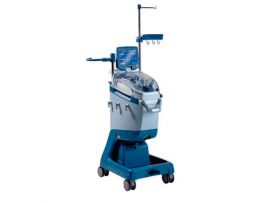Abstract Thrombosis and inflammation represent major challenges limiting the functionality of asymmetric poly(4-methyl-1-pentene) (PMP) hollow fiber membranes in extracorporeal membrane oxygenation (ECMO) systems. Moreover, the interplay between these two pathological..
Read MoreAbstract How are clinicians to preserve core clinical skills in an era of algorithmic assistance? As artificial intelligence (AI) assumes a growing role in clinical practice, concern is mounting that..
Read MoreAbstract Introduction Current extracorporeal membrane oxygenation (ECMO) monitoring methods for circuit obstructions have limitations. In this study, we test the hypothesis that changes in flow in a pre-existing shunt tubing..
Read MoreAbstract Background Neurological complications significantly contributed to mortality in patients with acute respiratory distress syndrome (ARDS) supported by venovenous extracorporeal membrane oxygenation (VV ECMO). Early fluctuations in arterial partial pressure..
Read MoreAbstract Vilobelimab, a first-in-class, human–mouse chimeric immunoglobulin G4 (IgG4) kappa monoclonal antibody, targets human complement component 5a (C5a) in plasma. Unlike upstream complement inhibitors, vilobelimab does not inhibit the generation..
Read MoreAbstract Background The COVID-19 Pandemic challenged the healthcare system worldwide, but its effect on outcomes of cardiac arrest (CA) and extracorporeal membrane oxygenation (ECMO) use are understudied. We examined trends..
Read MoreAbstract Purpose Postoperative bleeding is a major concern in pediatric cardiac surgery under cardiopulmonary bypass (CPB). The comparative utility of viscoelastic testing and central laboratory assays for predicting bleeding risk..
Read MoreAbstract Introduction Patients who undergo cardiac surgery have a high risk of significant blood loss and anemia. While allogeneic red blood cell (RBC) transfusions are effective, they are associated with..
Read MoreAbstract Perioperative hemorrhage during cardiac surgery is a frequent occurrence and can result in significant morbidity and mortality for patients. Prothrombin complex concentrate (PCC) and recombinant factor VIIa (rFVIIa) are..
Read MoreAbstract BACKGROUND: Patients on venoarterial extracorporeal membrane oxygenation (VA-ECMO) are frequently managed with varying degrees of hyperoxia. Existing data suggest that higher levels of Pao2 correlate with worsened outcome in patients..
Read MoreAbstract We appreciate the insightful remarks by Sin et al regarding our systematic review and meta-analysis on extracorporeal membrane oxygenation (ECMO) cannulation by intensivists. Their comments highlight important considerations for..
Read MoreAbstract Introduction Postoperative delirium (POD) is a frequent and serious complication after cardiac surgery. The glucose-to-albumin ratio (GAR) integrates metabolic and nutritional status, but its predictive value for POD in..
Read MoreAbstract Managing severe (AS) alongside complex (CAD) in frail patients is challenging. A 79-year-old female with resting dyspnea was diagnosed with severe AS and CAD. While (CABG) was the appropriate treatment for CAD,..
Read MoreAbstract Negative pressure ventilation (NPV) has been used to assist patients with respiratory failure. Venovenous extracorporeal membrane oxygenation (V-V ECMO) supports patients with acute lung injury who do not respond..
Read MoreAbstract Background Tranexamic acid (TXA) is recommended for reducing blood loss and transfusion in cardiac surgery. However, there are concerns regarding the safety profile of TXA, especially its proconvulsant effects...
Read MoreAbstract Introduction Bleeding events are common during the provision of Venoarterial ECMO (VA ECMO). Previous observational has suggested that these bleeding events are associated with an increased risk of in-hospital..
Read MoreAbstract BACKGROUND The use of extracorporeal life support (ECLS) in the trauma population remains controversial and has been reported only in small cohort studies. Recent ECLS technical advances have increased..
Read MoreAbstract Background The role of cardiac surgery in octogenarians is debated, but limited data exist for patients aged 65–79. This study compared clinical characteristics, surgical procedures, and outcomes between patients ≥ 80..
Read MoreAbstract Objective Metabolic acidosis is a common complication following cardiac surgery with cardiopulmonary bypass (CPB). Recent evidence suggests that unmeasured anions (UAs), assessed via the strong ion gap (SIG), may..
Read MoreAbstract Objectives To evaluate ECMO-related morbidity and mortality between Early-term (ET) and Full-term (FT) infants. Methods We performed a retrospective review of 3,831 neonatal ECMO runs for meconium aspiration syndrome..
Read MoreAbstract Objective To investigate the impact of veno-venous extracorporeal membrane oxygenation (VV-ECMO) cannula configuration and ECMO blood flow on intravascular hemodynamic environment, oxygen saturation, hemolysis, and thrombotic risk under varying..
Read MoreAbstract To prevent uncontrolled activation of the hemostatic system and thrombin formation that could be triggered by cardiopulmonary bypass (CPB), unfractionated heparin (hereinafter heparin) is administered to induce profound anticoagulation. Effective..
Read MoreAbstract Aims Cardiac surgery, as an intervention to repair cardiac pathology, may improve frailty, but the evidence is limited. This secondary analysis explored changes in frailty before and 6 months..
Read MoreAbstract Perioperative low cardiac output syndrome (LCOS) remains a significant complication in adult cardiac surgery, contributing to substantial morbidity, prolonged intensive care, and increased mortality. Its incidence is expected to..
Read MoreAbstract Background Pulsatile perfusion is a developing technique that attempts to mimic the natural pulsatile flow of blood during cardiopulmonary bypass (CBP). Purpose This systematic review and meta-analysis was conducted..
Read MoreSava Center, Milentija Popovica 9, Belgrado, Beograd, RS, 11070 Main Congress Hall
Read MoreAbstract Background Extracorporeal cardiopulmonary resuscitation (ECPR) may reduce mortality and improve neurological outcomes in patients with cardiac arrest. We updated our existing meta-analysis and trial sequential analysis to further evaluate..
Read MoreAbstract Background The optimal arterial cannulation strategy for establishing antegrade cerebral perfusion during aortic arch surgery remains a subject of ongoing debate. Our meta-analysis compares outcomes between axillary artery (AxA)..
Read MoreAbstract Background Family members making decisions about ECMO initiation face high-stakes uncertainty, emotional stress and cultural–ethical dilemmas. However, existing research lacks a synthesised understanding of these decision-making experiences across contexts...
Read More



















